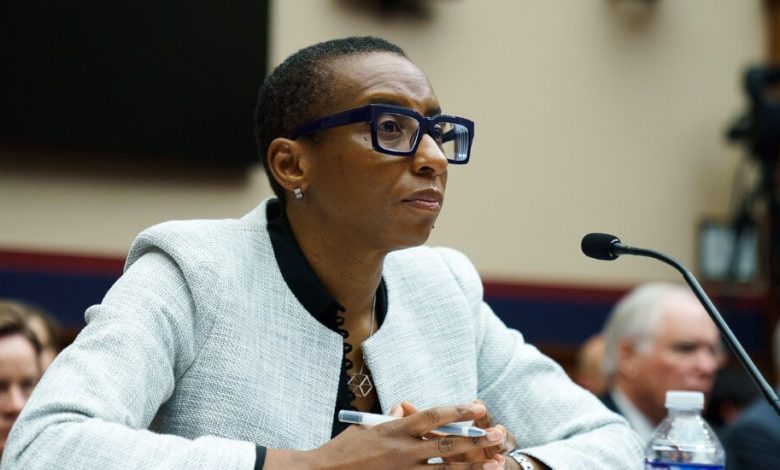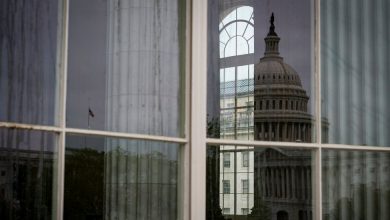Harvard’s Board Says President Will Stay, Despite Calls for Her Ouster

Claudine Gay will stay on as president of Harvard University, the school’s governing board announced on Tuesday, despite an uproar over her evasive answers at a congressional hearing about campus antisemitism.
The members of the board, the Harvard Corporation, deliberated into the night on Monday before ultimately deciding not to remove Dr. Gay, the university’s first Black president, from her post.
“As members of the Harvard Corporation, we today reaffirm our support for President Gay’s continued leadership of Harvard University,” said a statement signed by all of the board members other than Dr. Gay. “Our extensive deliberations affirm our confidence that President Gay is the right leader to help our community heal and to address the very serious societal issues we are facing.”
But the statement also faulted Dr. Gay’s initial response to the Hamas attack on Israel on Oct. 7, which many critics said was halfhearted and inadequate.
“So many people have suffered tremendous damage and pain because of Hamas’s brutal terrorist attack, and the University’s initial statement should have been an immediate, direct, and unequivocal condemnation,” the board’s statement said.
Dr. Gay now faces the challenge of regaining the confidence of the Harvard community, which has been deeply divided over the school’s handling of the protests that broke out on campus after Oct. 7. Some of the protests became unruly and raised alarm among some faculty members, students and alumni about whether Harvard was doing enough to combat antisemitism.
The Harvard Corporation’s statement also signaled a serious effort by university leadership to rein in student conduct. “We champion open discourse and academic freedom, and we are united in our strong belief that calls for violence against our students and disruptions of the classroom experience will not be tolerated,” the statement said.
Like many other elite universities, Harvard has struggled to strike a balance between allowing students the freedom to express their views on the Israeli-Palestinian conflict and disciplining those who cross the line into threatening or disruptive behavior.
Support for Dr. Gay’s presidency, which began in July, began eroding with her initial reluctance to condemn the Hamas attacks. After criticism from influential figures like Lawrence H. Summers, the former Treasury secretary, Dr. Gay issued stronger condemnations, but that was not enough to assuage the fears of many Jewish students or alumni.
Dr. Gay’s critics expressed their dissatisfaction with the board’s decision on Tuesday.
“This is a moral failure of Harvard’s leadership and higher education leadership at the highest levels,” said Representative Elise Stefanik, the New York Republican whose aggressive questioning of Dr. Gay during a hearing on Capitol Hill last week led to calls for her resignation.
Some of Dr. Gay’s supporters seemed eager to put the divisive episode behind them. Laurence H. Tribe, a Harvard law professor emeritus, had criticized Dr. Gay’s performance at the congressional hearing as “hesitant, formulaic and bizarrely evasive.” Yet he joined hundreds of other members of the faculty in signing a petition calling for Dr. Gay to keep her job, saying it was dangerous for universities to be bullied into making decisions about whom to hire and fire.
“I do think that building bridges is preferable to exploding them,” Mr. Tribe said on Tuesday, after the board announced its decision to keep Dr. Gay as president.
After her widely criticized Dec. 5 appearance before a House committee, donors, alumni and students ratcheted up a pressure campaign to oust her, while supporters banded together to try to save her job. About 700 members of Harvard’s faculty, and hundreds more alumni, came to her defense in several open letters.
One of the letters, from Black faculty members, called the attacks on the president “specious and politically motivated.” The letter, which was drafted and signed by some of Harvard’s most prominent professors, said that Dr. Gay “should be given the chance to fulfill her term to demonstrate her vision for Harvard.” A group of more than 1,000 Black alumni also defended her in an open letter, writing, “While the current issues at play are complex, her commitment to fighting antisemitism, Islamophobia, and racism has never wavered.”
One of the most outspoken critics of Dr. Gay, William A. Ackman, a billionaire hedge fund manager and Harvard alumnus, said in an interview earlier this week that she should resign for the good of the school. “I don’t see a scenario where she survives for the long term, or even the intermediate term,” he said in the interview.
On Tuesday, Mr. Ackman declined to comment.
Some pro-Palestinian voices on campus praised the board’s decision to retain Dr. Gay, but said that deeper issues remained. “I think the statement needed to condemn Islamophobia and reject any notion that teaching about racism is akin to promoting antisemitism,” said Khalil Gibran Muhammad, a professor at the Harvard Kennedy School.
Over the last two months, Dr. Gay has made a point of addressing the concerns of Jews who found her initial response to the Hamas assault lacking.
On Oct. 27, at a Shabbat dinner at Harvard Hillel, she announced the formation of an advisory group to help her “develop a robust strategy for confronting antisemitism on campus.” And she condemned the phrase “from the river to the sea,” which is chanted by pro-Palestinian protesters and condemned by some Jews as antisemitic.
“Our Jewish students have shared searing accounts of feeling isolated and targeted,” she said. “This shakes me to my core — as an educator, as a mother, as a human being. Harvard must be a place where everyone feels safe and seen. It is just the right thing to do.”
But despite these efforts, her appearance in Washington with two other university presidents, Elizabeth Magill of the University of Pennsylvania and Sally Kornbluth of M.I.T., shook her presidency.
During the hearing, Ms. Stefanik pelted the presidents with hypothetical questions that, on Saturday, led to Ms. Magill’s resignation from Penn.
“At Harvard,” Ms. Stefanik asked Dr. Gay, “does calling for the genocide of Jews violate Harvard’s rules of bullying and harassment? Yes or no?”
Dr. Gay replied, “It can be, depending on the context.” Pressed by Ms. Stefanik, Dr. Gay added a few moments later, “Antisemitic rhetoric, when it crosses into conduct that amounts to bullying, harassment, intimidation, that is actionable conduct, and we do take action.”
Ms. Stefanik tried again: “So, the answer is yes, that calling for the genocide of Jews violates Harvard code of conduct, correct?”
Dr. Gay answered, “Again, it depends on the context.”
The exchange rocketed across social media and infuriated many people with close ties to Harvard.
Dr. Gay moved to contain the fallout with an apology in an interview that was published on Friday in The Harvard Crimson, the campus newspaper.
“When words amplify distress and pain, I don’t know how you could feel anything but regret,” Dr. Gay told The Crimson.
She also told the newspaper that she had been “caught up” in the exchange with Ms. Stefanik, but that she “should have had the presence of mind” during her testimony to “return to my guiding truth, which is that calls for violence against our Jewish community — threats to our Jewish students — have no place at Harvard and will never go unchallenged.”
Alan Blinder, Mable Chan, Rob Copeland, Lauren Hirsch, Sarah Mervosh and Vimal Patel contributed reporting.




